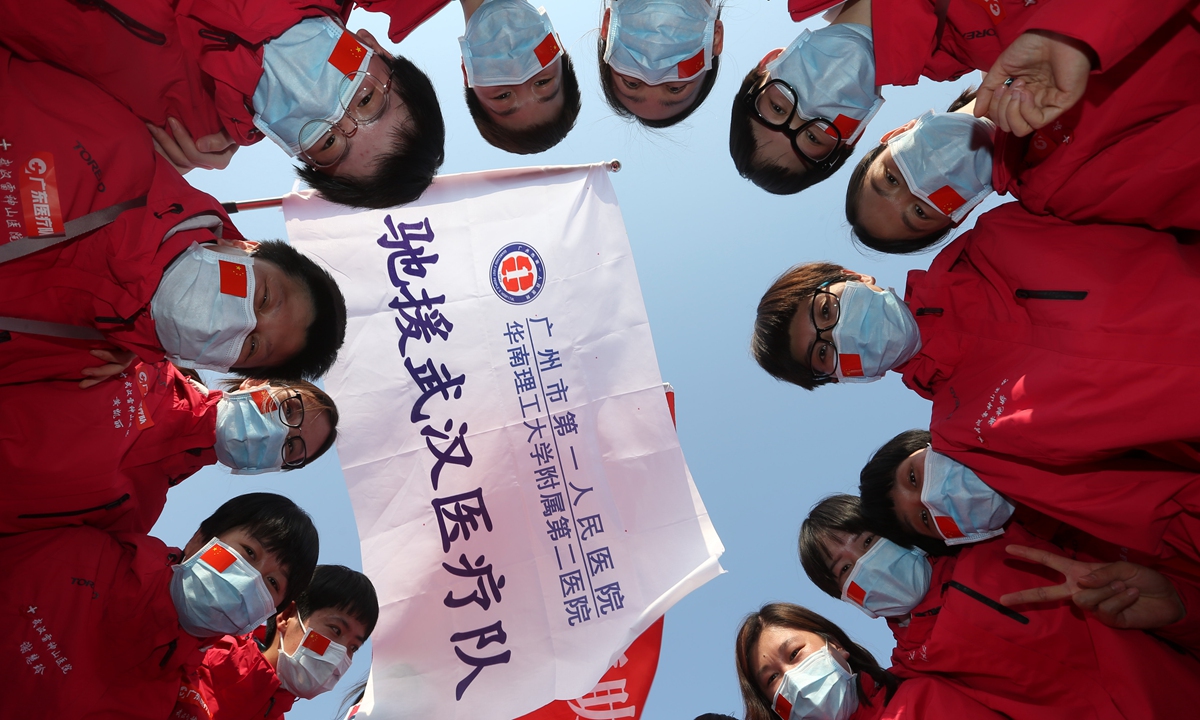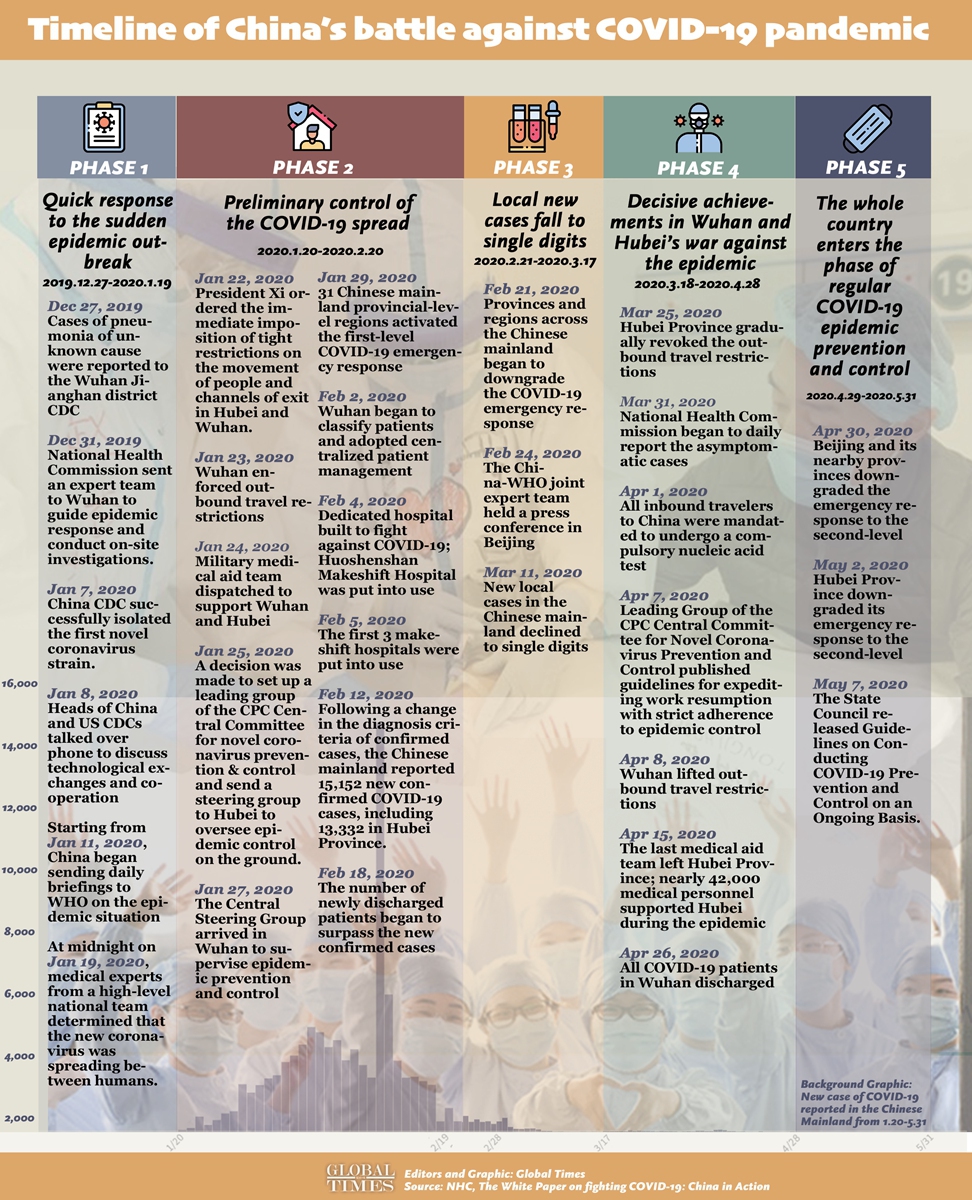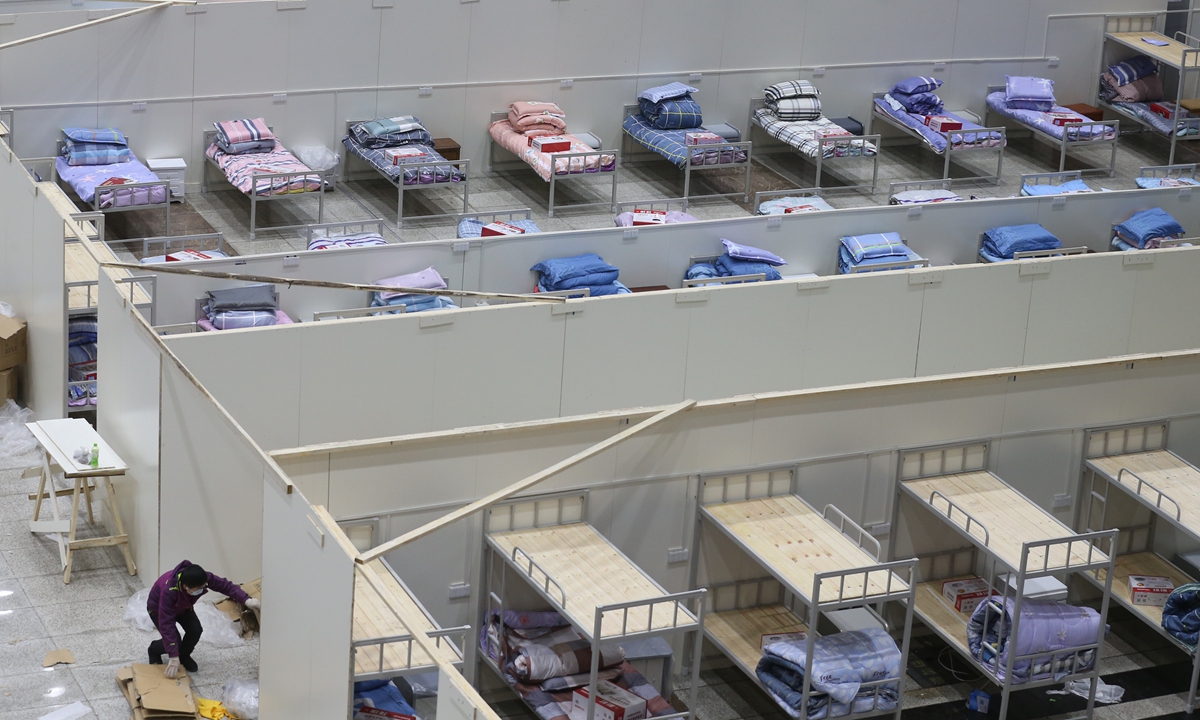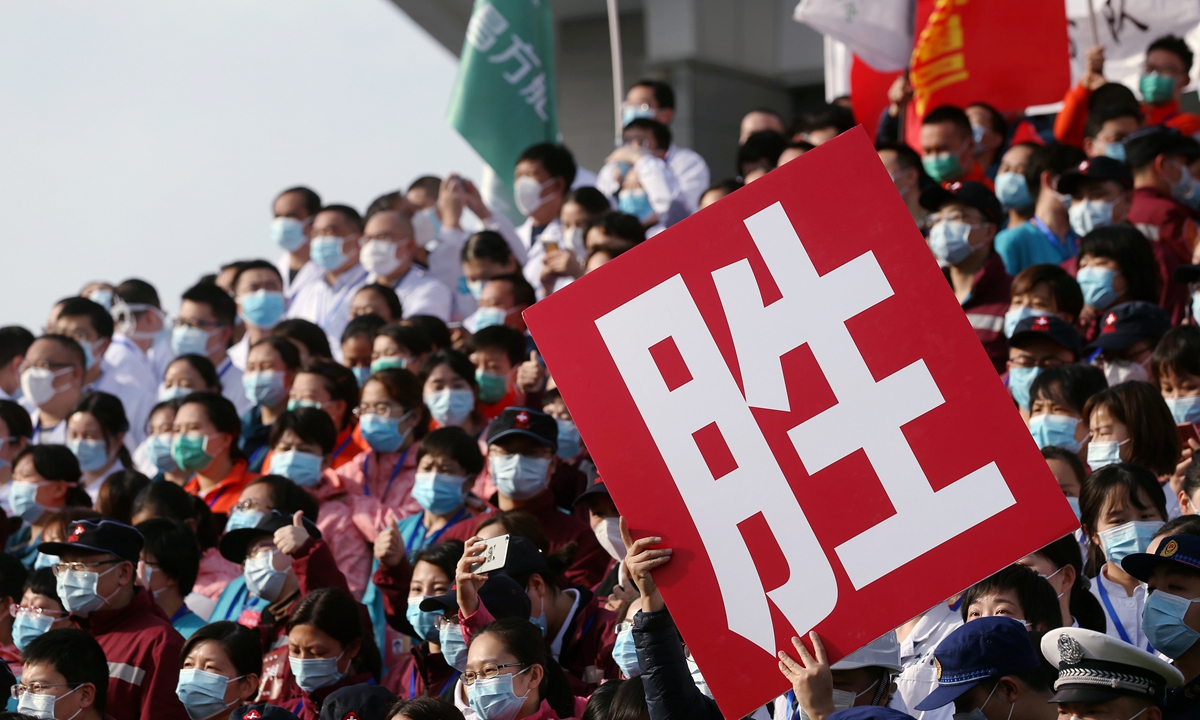No one in the world would have imagined they had to live through difficult times amid the coronavirus pandemic that has completely changed the way we live. When many Chinese people thought they had successfully contained the outbreak in mid-March, they didn't expect to see more and more countries later engulfed in this "war against the virus". German Chancellor Angela Merkel recently made a rare emotional appeal, calling for tougher measures for Christmas social distancing while the single-day death in the US caused by COVID-19 has exceeded that of the 9/11, a much deeper reflection is necessary on this virus battle. Is it about a competition between different governance system? How to strike a balance between individual freedom and the collective public health? This is the fourth investigative story the Global Times has conducted as the year draws to a close. The previous articles probed into the possibility that Wuhan's outbreak was caused by imported cold-chain products, China's stricter management of imported frozen products, and Wuhan's reemergence from the epidemic one year on.

Before Miguel Moreira, a Portuguese football coach, took a chartered flight in February from China to Portugal, he had already experienced the lockdown in Wuhan, capital city of Central China's Hubei Province that first reported the coronavirus case a year ago. As he understood how strict preventive measures authorities in Wuhan took, including mandatory mask-wearing, social distancing and rigorous quarantine, which proved to be effective in containing community outbreak, Moreira said he developed the habit of wearing a mask, washing hands and disinfecting frequently.
"The Portuguese government didn't ask us to quarantine, but I took the initiative to do so. It was in Portugal that I felt how right the Chinese government's decision was to lock down the city," he told the Global Times in a recent interview in Wuhan.
Portugal imposed its first ever state of emergency on March 19, ending in early May after two extensions. With the arrival of the second wave of outbreak as the weather becomes cold, Portugal again declared a 15-day state of emergency on November 9.
"If the Portuguese government took more decisive measures initially and Portuguese people were wearing masks obediently, there would not be a second wave in the country," said the Portuguese football coach who has now been back to Wuhan, continuing his work at a local football academy.
After months of all-out efforts in containing the virus spread, many people in China can now enjoy traveling again, meeting family members and friends, gathering around during National Day holidays in October and the approaching New Year celebration, which, however, has become "a new craving" for others living in Western countries that have been experiencing the second and even the third wave of the outbreak.
After witnessing how local authorities in China brought the situation under control within several months, Haroon, a Pakistani who has been living in Wuhan for almost five years and took a volunteer job during the epidemic, considered the unity of the people the most impressive.
For Haroon, the earlier outbreak was completely unexpected, followed by an unprecedented lockdown. "We were worried about our small baby… and for the very special situation that no one has any information… you can say it was scary," he told the Global Times.
Like many who then had little information about the coronavirus and an unknown infectious disease, Haroon chose to listen to the guidelines from the government, followed the instructions by staying at home, avoiding travel and gatherings, which generated strong public awareness to be responsible for themselves and others.
To deal with the infectious disease, a strong intervention from the administration is a must to trace contacts and cut off transmission chain, which can't be done only by doctors, Peng Zhiyong, director of the ICU at Zhongnan Hospital of Wuhan University, told the Global Times. "Doctors can treat patients at the hospital, but how about the community? We need the government to mobilize all," he said.
When some raised doubts about how Wuhan could quickly contain the virus spread, indicated by declining new cases in March, Peng said they did not look at the strict management that local communities undertook, for example, household information registration, food delivered to the doorsteps and daily body temperature checks.
"Everywhere you went, anyone you spoke to, there was a sense of responsibility and collective action, and there was war footing to get things done," Bruce Aylward, a WHO epidemiologist who led the international team to China in February and briefed them about its findings in Beijing then, was quoted as saying in previous media reports on China's experiences in flattening the curve.
Some foreign scholars and media outlets contributed China's swiftness in bringing the epidemic under control to the so-called authoritarian regime. For instance, the New York Times said in a recent article that "China's authoritarian government has the ability to act in a way that democracies that must be accountable to the public cannot.
However, in addition to difference in governance system, other factors, such as respecting science and professionals, have contributed to different anti-epidemic work in different countries.



Abe Forman-Greenwald, a California-based film producer, said he had just shared a socially distanced outdoor Thanksgiving meal with his wife and two close friends, as well as their baby in Los Angeles. "It ended up being a lovely meal, but felt strange because of the precautions we took to avoid possible COVID transmission," he told the Global Times.
"We sat far apart from them, wiped our chairs with disinfectant, and took our turn serving ourselves buffet style. It was a much smaller gathering than we usually have when we spend the holiday with family," he said.
However, not all Americans like him followed the social distancing guidelines, prompting concerns over a significant surge in COVID-19 cases following Thanksgiving and heading into Christmas, as over three million people traveled through the nation's airports, CNBC reported, despite the US Centers for Disease Control and Prevention warning against traveling for the holiday and gathering.
The US has now recorded its most coronavirus-related deaths in a week, as a brutal surge gathers speed across the country, according to the New York Times, suggesting that the new peak is coming as the nation prepares for holiday celebrations when millions act against the warnings of public health officials.
"Many Americans would define freedom as the right to make individual choices without being told what to do by the government or institutions. That has not served our country well through this crisis," the California-based producer said.
"It is a short-sighted view, and in my mind freedom requires a set of moral responsibilities to the safety of a community. Sadly, that has not been a universal value in the US this year," he added.
When some compared China's response to epidemic with that of the West, they pointed to different political systems. However, such a view has not fully reflected layers of different societies and complex systems, according to observers.
"It's a little bit too simple to chalk up everything to systems," renowned American political scientist Joseph Nye, who is also a professor at Harvard University, told the Global Times.
"I think both countries started out badly in their response to the pandemic with denial and blame-shifting. But China was able to contain the pandemic and recovered more rapidly than the US, whereas Trump and the American administration were very inconsistent in their messages and policies," Nye said, adding that the US is still paying the price for the incompetence of Trump's leadership.

When it comes to virus control, a major difference between China and the US was whether policymakers have the courage and wisdom to re-examine the country's emergency responding mechanism and fix the loopholes. More importantly, it's about whether top leaders could drop blind arrogance, help form a consensus of respecting the science and take the epidemic seriously, be less selfish as people share a destiny.
"I live in a democracy. But as Thanksgiving approached, I found myself longing for the type of freedom I am seeing in China," Elanah Uretsky, a professor at Brandeis University, was quoted as saying in a recent article on the Conversation.
"My research suggests that the control of the virus in China is not the result of an authoritarian policy, but of a national prioritization of health", she said, noting that China learned a tough lesson with SARS.
For many frontline doctors and nurses in Wuhan, what impressed them the most was the country's all-out efforts to offer as much help as possible to the city at the beginning of the outbreak. Rather than interpreting it as China's system advantages for full-scale mobilization, many would take it as instinct reaction of taking other people's pain as their own, and solidarity has become one of the most important factors beyond the different political systems that helped effectively contain the outbreak.
Zhang Jixian, the director of respiratory and critical care medicine department of the Hubei Provincial Hospital of Integrated Chinese and Western Medicine, said what impressed her the most were the 100 supportive medical workers from Guangdong and Beijing who came to the hospital during the Spring Festival, the most important Chinese holiday for family reunions. "They helped us pull through the most dangerous, busiest and hardest period," she said.
China initiated the largest scale medical support operation since 1949 to mobilize the nation's medical resources in aiding Wuhan and Hubei Province at the early outbreak by dispatching 346 national-level medical teams with 42,600 medical staff, and over 900 public health staff to the province from January 24 to March 8. The People's Liberation Army also dispatched over 4,000 medical workers to Hubei, in charge of treatment in several local hospitals.

For Wuhan residents who saw so many medics working in such a selfless manner, it was also the moment when they sensed the strength of the solidarity.
"For the first time in my life I saw the power of unity, which used to be a word with no actual meaning to me," Huang Junxi, a teenager who had experienced the lockdown of Wuhan, told the Global Times.
The 12-year-old who used to look up to the US, assuming that the US always outperforms China, realized for the first time there's no need to envy others, as during the unprecedented crisis, only home country would take care of its own people, He Aimin, the mother of Huang who works at a local bus operating group, told the Global Times.
Anti-virus battle has reshaped Chinese people's world view, however it puzzles them and Chinese scholars that despite China's successful anti-epidemic work, the West keeps criticizing China.
"It's time to remove the label on China for the absence of so-called democratic elections," Zheng Ruolin, a senior Chinese media professional and European studies, told the Global Times, as the pandemic has exposed some deep-rooted problems of societies that practice a Western-styled democratic system. Some theories about rotating of different parties, judiciary independence and freedom of press many have not touched the essence of democracy, which is supposed to represent the majority of the public will and include various classes of the society.
"These two principles have been fully underscored during the anti-epidemic battle in China," Zheng said, noting that the virus has been treating all countries equally with a significant contrast between China and the West, which also raised the question of who is truly serving its people.

Some foreigners who have been living in China for years said China successfully contained the outbreak not only because of strong top-down governance but also because of scientific measures, such as the combination of traditional Chinese medicine and western medicine, and strong support for frontline medics, volunteers and social workers.
"Even in my country… they are asking about one [Chinese] medicine for [treating] the fever - Lianhua Qingwen," Tonya, Haroon's wife, who comes from Kazakhstan and has lived in China for more than 10 years, told the Global Times.
Local authorities still paid employees even if they stayed at home, during the city lockdown, and the government provided help while people helped each other to pull through the difficult time, she said.
The industrial infrastructure, financial infrastructure and internet infrastructure are developed here. And everyone committed to the fight against the pandemic, she added.
